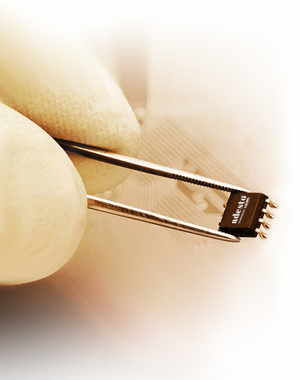From Adesto, Memory Solution That Will Reduce Power Consumption in Smart Devices
Four densities: 32, 64, 128, and 256Kb
This is a Press Release edited by StorageNewsletter.com on February 25, 2016 at 2:56 pmAdesto Technologies Corporation introduced a solution for non-volatile memory needs of battery powered and energy harvesting sensors.

The Moneta family continues in designing next-generation products uniquely suited to connected devices, including Internet of Things, wearables, medical, and industrial sensors.
Moneta is a discrete, ultra low power memory solution, designed to reduce overall system cost in connected sensors – some of which will need to operate for years without a battery charge. It’s optimized for energy, speed, and the ability to execute-in-place, allowing manufacturers unprecedented freedom of design. Moneta chips can withstand medical sterilization processes, making them uniquely suited for smart medical devices.
“The hardware landscape is changing quickly,” said Narbeh Derhacobian, CEO, Adesto. “Off-the-shelf memory products were appropriate for the smartphone and PC markets, but they cannot satisfy the requirements of a new world of connected things. Unless we can dramatically reduce power consumption, the cost of changing batteries will prevent IoT from becoming a reality. At Adesto, we are laser focused on this emerging market, and Moneta demonstrates our ability to execute and deliver next-generation products to meet its requirements.“
The Moneta family leverages company’s Conductive Bridging RAM (CBRAM) technology, which affords ultra low power consumption without sacrificing speed or performance. The company offer a resistive RAM technology; it announced in June 2014 the shipment milestone of one million CBRAM Units.
In addition to its low power consumption, CBRAM has an ability to withstand the corroding effects of gamma and electron beam sterilization treatments, overcoming a critical barrier to the design of intelligent medical devices. The tendency of flash to corrode during medical sterilization processes requires elaborate workarounds for embedding it in smart devices, and is a fundamental barrier to innovation.
“These products were designed to meet specific needs we saw in emerging customer industries of IoT and medical devices,” said Gideon Intrater, CTO, Adesto. “We focused on reducing overall cost of ownership in these applications, primarily through low power consumption and ease of integration. We’ll continue to design variations to optimize this product family for the specific needs of our customers“.
“We need new non-volatile memories“, said Simon Segars, CEO, ARM Holdings PLC. “Flash is great, but for IoT devices it’s not so good – it’s power hungry. We need high density with reliability and low-voltage operation that involves not just scaling of today’s flash down but a really low-cost process with fewer steps to integrate into devices.“
The company is planning to start production of the Moneta product family in 2016. The initial offering provides a range of four densities: 32k, 64k, 128k, and 256k.












 Subscribe to our free daily newsletter
Subscribe to our free daily newsletter
